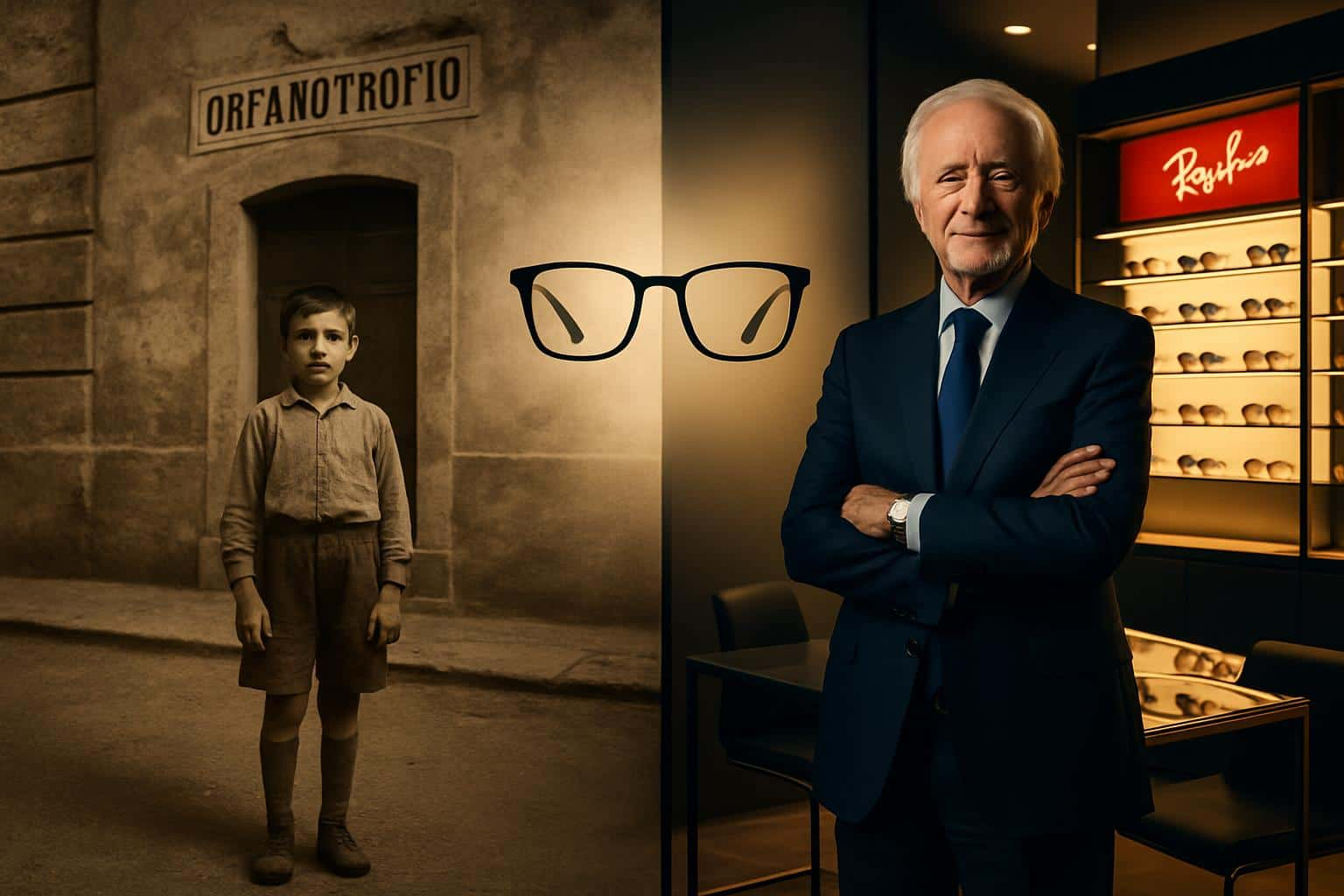Table of contents
Leonardo Del Vecchio transformed from an orphaned child in war-torn Milan to the billionaire founder of Luxottica, the world’s largest eyewear empire. His journey represents one of Italy’s most remarkable rags-to-riches stories, proving that vision and determination can overcome the most challenging circumstances.
Born into poverty in 1935, Del Vecchio faced abandonment at age seven when his widowed mother could no longer support her five children. The orphanage became his home for seven crucial years. Yet from these humble beginnings, he built a global empire worth billions.
His story resonates with entrepreneurs worldwide who face seemingly insurmountable obstacles. Del Vecchio’s path from metalworker to mogul demonstrates how strategic thinking, relentless innovation, and calculated risk-taking can create extraordinary success.
The man behind Ray-Ban, Oakley, and countless other iconic brands never forgot his origins. His business philosophy centered on vertical integration and quality craftsmanship. These principles guided Luxottica’s growth from a small workshop to a multinational corporation.
Del Vecchio’s legacy extends beyond financial success. He revolutionized how the world views eyewear, transforming glasses from medical necessity to fashion statement. His influence shaped an entire industry and created thousands of jobs globally.
This remarkable journey offers valuable lessons for aspiring entrepreneurs. Del Vecchio’s story proves that background doesn’t determine destiny. Hard work, strategic vision, and unwavering persistence can overcome any obstacle.
Understanding his path provides insights into building sustainable business empires. His methods remain relevant for modern entrepreneurs seeking to create lasting impact. The Leonardo Del Vecchio story continues inspiring business leaders across industries.
Early Life & Struggles
Childhood in War-Torn Milan
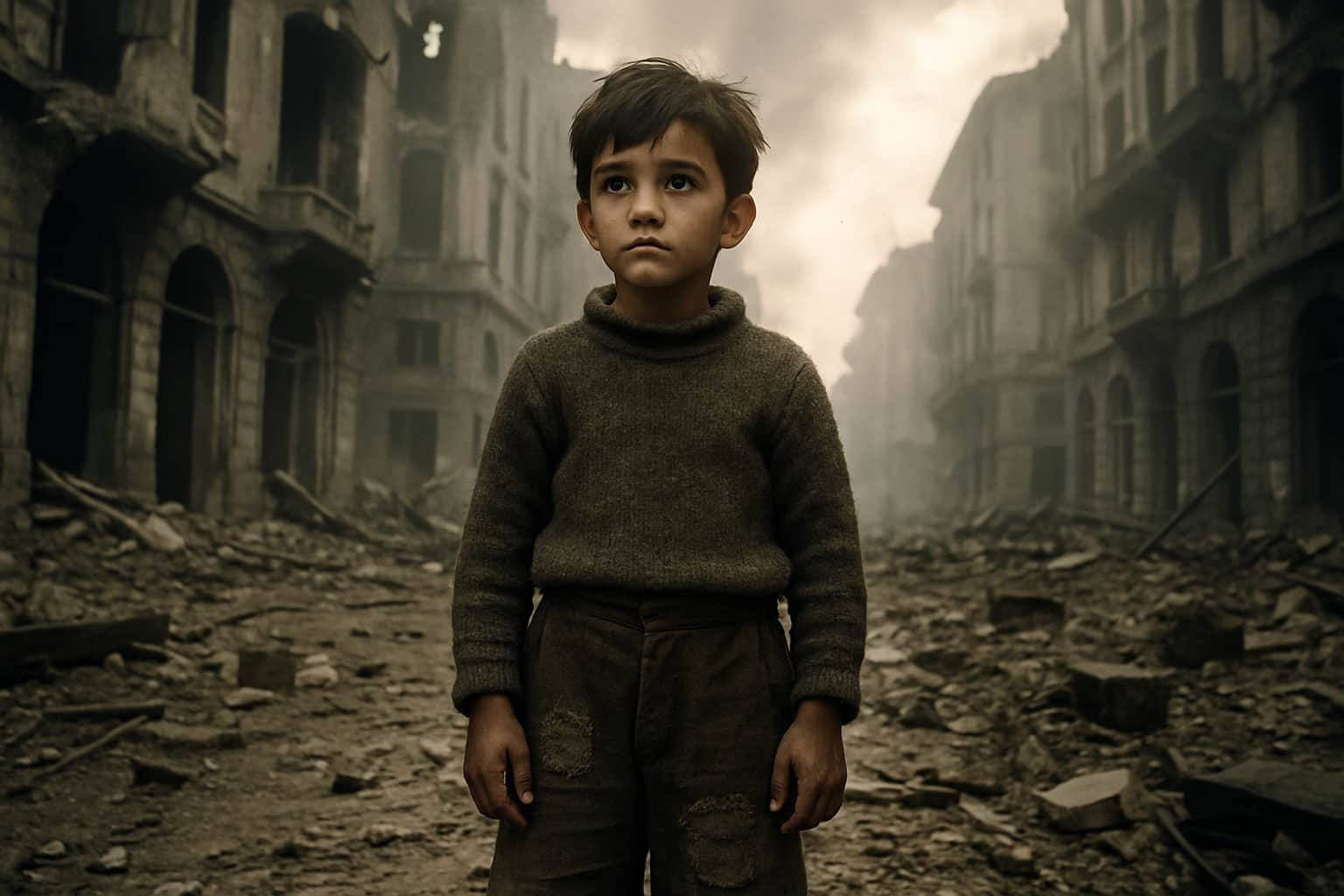
War-torn Milan in 1935 welcomed Leonardo Del Vecchio into a world of hardship and uncertainty. His father, a humble street vendor selling vegetables, died before Leonardo’s birth. The family struggled with poverty that would define his earliest years.
Life in the Orphanage
Leonardo’s mother faced an impossible choice when he reached seven years old. Supporting five children alone proved overwhelming during World War II’s devastating impact on Italy. She made the heartbreaking decision to place Leonardo in a Milanese orphanage.
The orphanage walls became Leonardo’s world for seven formative years. Other children shared similar stories of abandonment and loss. Yet these experiences forged his character and determination. He learned self-reliance and developed an unshakeable work ethic.
Lessons in Survival
Daily life in the orphanage taught harsh lessons about survival and perseverance. Leonardo watched older children leave to find work and support their families. He understood that education and skills would determine his future prospects.
Early Work and Injury
At fourteen, Leonardo left the orphanage to begin his working life. His first job involved apprenticing with a tool and die maker in Milan. The work proved dangerous and demanding for such a young person. He lost part of his left index finger during this period.
Balancing Work and Study
Despite physical hardships, Leonardo embraced learning opportunities in metalworking and craftsmanship. His supervisors recognized his natural talent and dedication to quality work. These skills would later prove instrumental in his business success.
Evening hours brought additional challenges as Leonardo pursued education at Brera Fine Arts Academy. He studied industrial engineering and design while working full days. This demanding schedule tested his physical and mental limits.
A Spark of Vision
Education Meets Craftsmanship
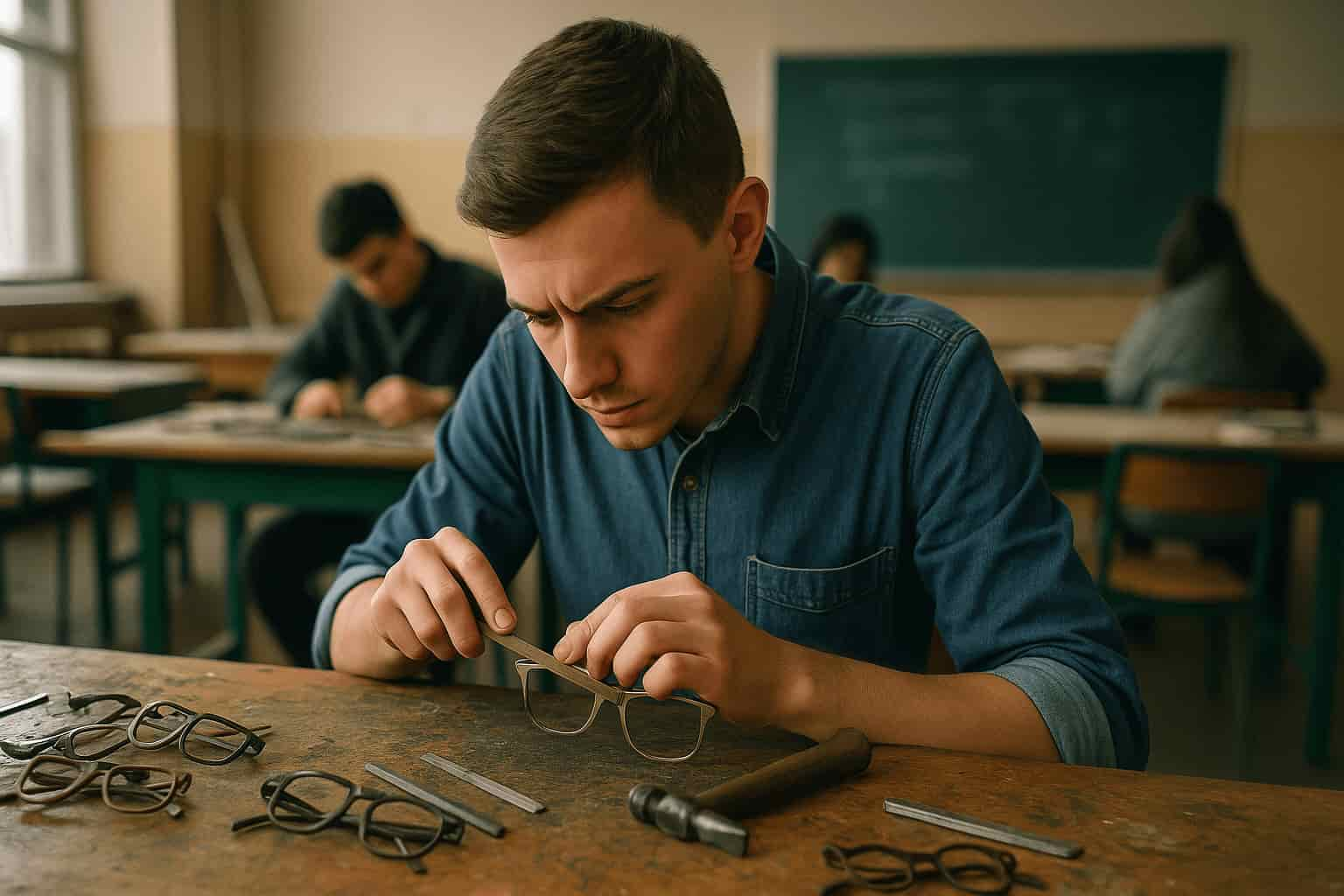
Financial pressures constantly threatened his educational pursuits. Leonardo worked to support both himself and his struggling family. Many nights involved choosing between rest and study. His determination never wavered despite exhaustion.
The combination of practical metalworking experience and formal design education created unique advantages. Leonardo developed both technical skills and aesthetic sensibilities. This rare combination would distinguish him from competitors throughout his career.
Discovering Eyewear
His fascination with eyeglasses began during these formative years. The precision required in spectacle manufacturing appealed to his perfectionist nature. He recognized the potential for innovation in this traditional industry.
Turning Points
From Technician to Strategist
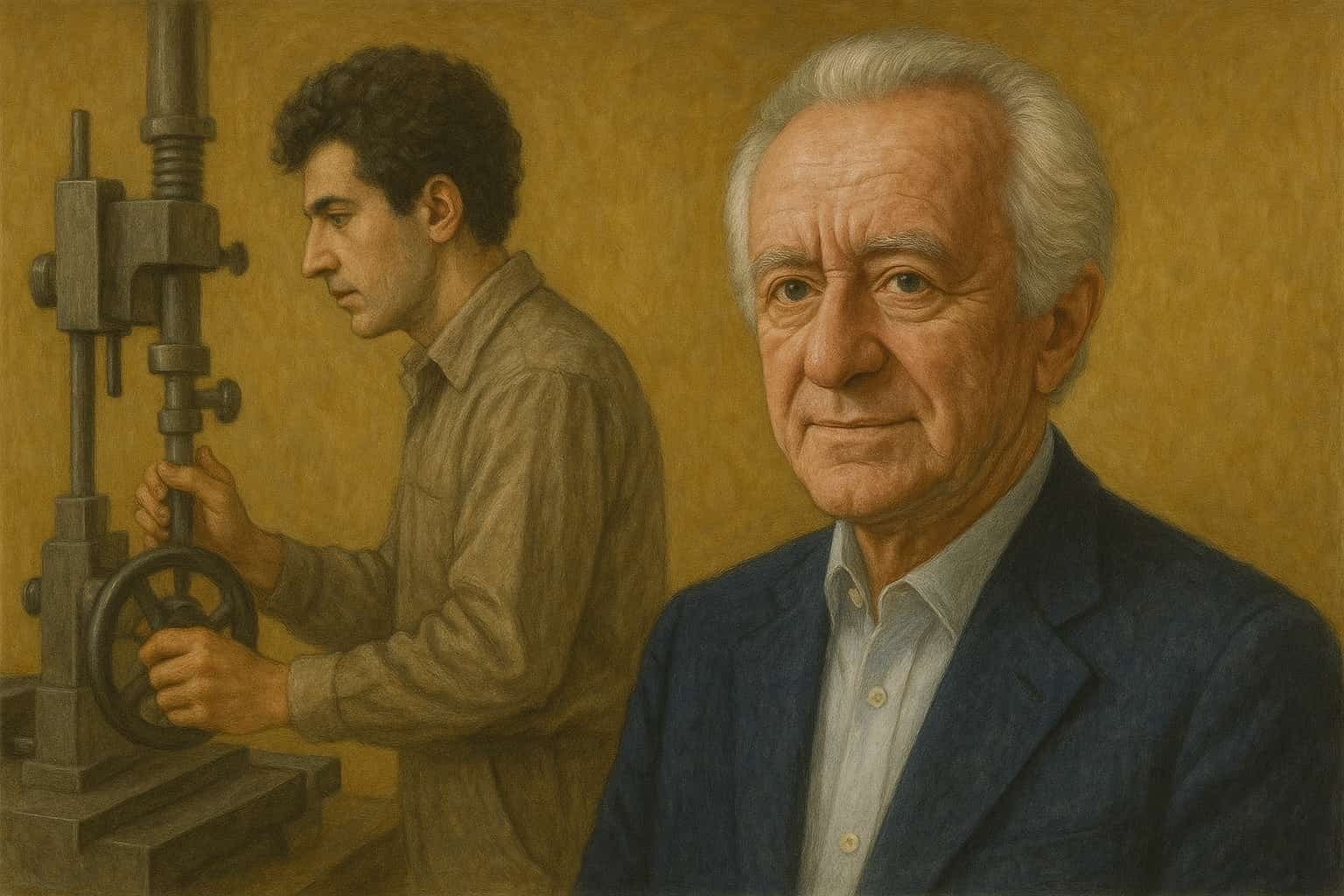
Leonardo’s first major turning point came through recognizing opportunity where others saw limitation. His metalworking apprenticeship provided skills that most eyewear manufacturers lacked. He understood both the technical and artistic aspects of frame creation.
A Niche in Eyewear
The decision to specialize in spectacle parts marked his initial strategic breakthrough. While others focused on complete manufacturing, Leonardo identified a profitable niche. His precision metalworking skills commanded premium prices from established manufacturers.
Choosing Agordo
Agordo represented the geographical turning point that changed everything. This small town in the Veneto region offered unique advantages for ambitious entrepreneurs. Local government provided free land and economic incentives to attract new businesses.
The location choice proved brilliant for multiple reasons beyond financial incentives. Agordo sat in the heart of Italy’s eyewear manufacturing region. Established companies provided ready markets for high-quality components. Skilled workers were available locally.
Design Education’s Influence
Leonardo’s evening education at Brera Academy created intellectual turning points that shaped his vision. Design principles learned there influenced his approach to eyewear aesthetics. He understood that function and beauty must work together seamlessly.
Founding Luxottica
The 1961 establishment of Luxottica s.a.s. marked his entrepreneurial turning point. At twenty-six, Leonardo committed fully to his business vision. He invested everything in creating a limited partnership focused on excellence.
Scaling With Strategy
A Focus on Quality
His decision to hire only ten carefully selected employees reflected strategic thinking. Quality mattered more than quantity in his business philosophy. Each worker contributed specialized skills essential for superior products.
Vertical Integration
Recognition of vertical integration’s importance created another crucial turning point. Leonardo understood that controlling the entire production process would provide competitive advantages. This insight guided his expansion strategy for decades.
Becoming a Full Manufacturer
The transition from component supplier to complete frame manufacturer represented his boldest strategic pivot. By 1971, Leonardo abandoned contract manufacturing entirely. He focused exclusively on finished eyeglass frames under the Luxottica brand.
This decision required enormous confidence in his vision and capabilities. Many advisors questioned abandoning established revenue streams. Leonardo’s conviction in his strategy proved absolutely correct.
Breakthrough Success
Entering the Global Stage

The MIDO exhibition in Milan became Leonardo’s breakthrough moment that transformed Luxottica from local workshop to industry player. This prestigious international optical trade fair attracted the world’s leading eyewear manufacturers and buyers.
Global Attention and Orders
Leonardo’s debut at MIDO showcased his first complete eyeglass frames to a global audience. The original designs and superior manufacturing quality immediately captured attention. Industry veterans recognized the exceptional craftsmanship and innovative aesthetics.
Orders flooded in following the exhibition’s overwhelming positive response. Leonardo and his small team returned to Agordo with more business than they had ever imagined. The success validated his decision to focus on complete frames rather than components.
Scaling With Innovation
Investing in Automation
The breakthrough required scaling production rapidly while maintaining quality standards. Leonardo invested heavily in advanced machinery and automated processes. He understood that growth without quality would destroy his emerging reputation.
His foresight in studying machine design proved invaluable during this expansion phase. Leonardo personally designed automated molding and milling equipment for increased efficiency. He borrowed techniques from other industries, including electroplating methods from local jewelers.
Innovation in Materials
Research and development investments distinguished Luxottica from competitors during this crucial period. Leonardo allocated significant resources to plastics compounding, metallurgy, and basic chemistry. These investments improved product quality and reduced manufacturing costs.
Global Recognition and Influence
Luxottica Becomes a Trendsetter
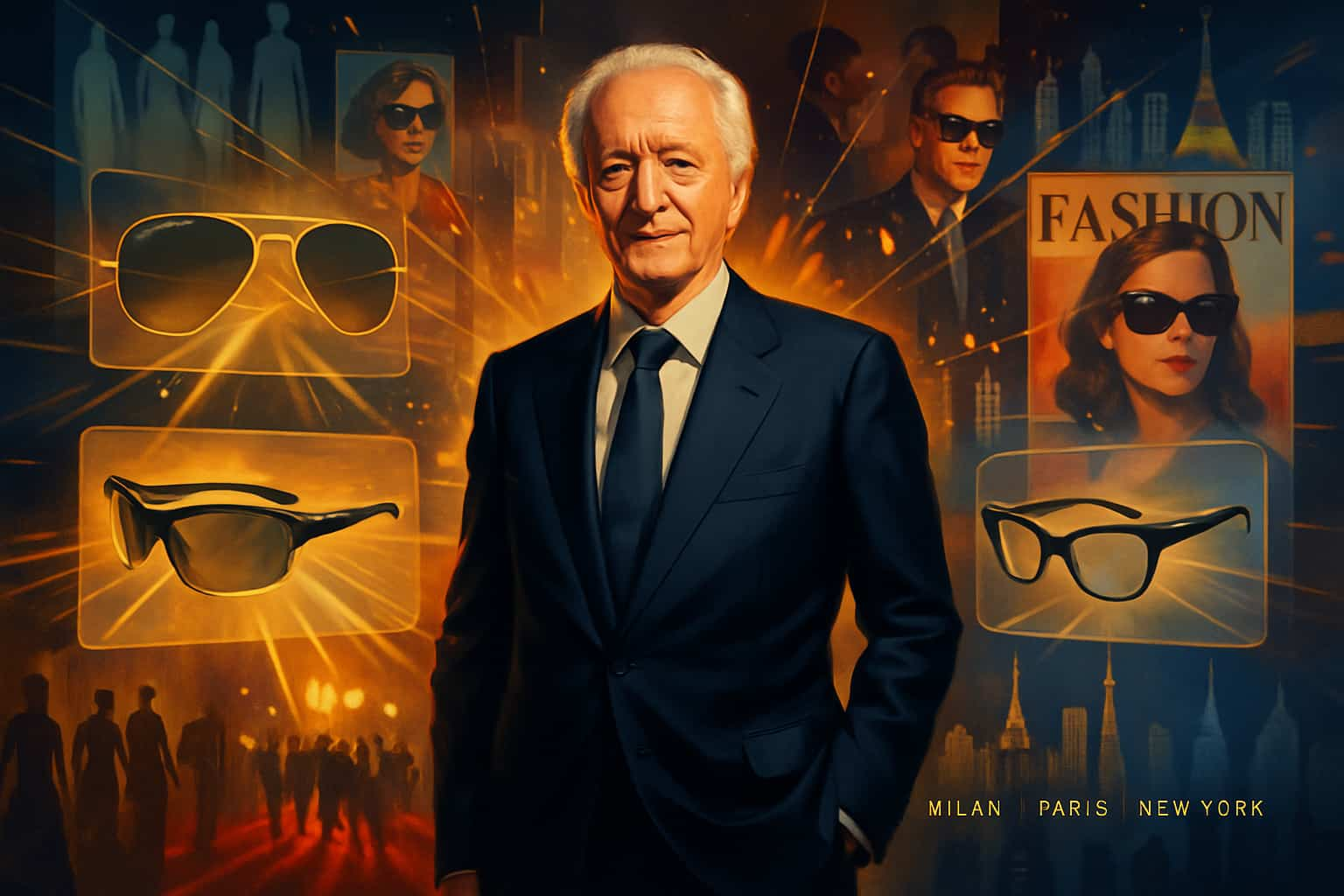
The 1970s brought sustained growth as Luxottica’s reputation spread throughout Europe. Leonardo’s strategy of continuous innovation kept the company ahead of competitors. He understood that standing still meant falling behind in the rapidly evolving eyewear market.
International recognition arrived as fashion magazines featured Luxottica frames in editorial spreads. Celebrities and influencers began wearing the distinctive designs. This organic marketing proved more valuable than traditional advertising campaigns.
Leonardo’s breakthrough success stemmed from his unique combination of technical expertise and aesthetic vision. Unlike competitors who focused solely on function or fashion, he integrated both elements seamlessly. This holistic approach created products that satisfied both practical and emotional needs.
Key Business Moves
Expanding Distribution
Leonardo’s acquisition of Scarrone in 1974 marked his first major strategic expansion beyond manufacturing. This distribution company provided direct access to retail markets across Italy. The move demonstrated his understanding that controlling distribution channels was crucial for long-term success.
Entering International Markets
The 1981 establishment of Luxottica’s first international subsidiary in Germany signaled global ambitions. Leonardo recognized that domestic success alone would limit growth potential. European expansion provided the foundation for worldwide operations.
Changing the Industry
The Armani Deal
His revolutionary 1988 licensing deal with Giorgio Armani transformed the entire eyewear industry forever. Leonardo understood that fashion brands could elevate eyeglasses from medical necessity to style statement. This partnership created the template for luxury eyewear collaborations.
The Armani deal’s success attracted other prestigious fashion houses seeking similar partnerships. Leonardo negotiated agreements with Bulgari, Chanel, Prada, and Valentino. Each partnership enhanced Luxottica’s reputation and market position.
Celebrity Endorsements
Celebrity product placement strategies revolutionized eyewear marketing under Leonardo’s direction. Movie stars, newscasters, and politicians wore Armani frames in high-profile appearances. Red carpet events showcased designer eyewear alongside couture gowns and tuxedos.
Aggressive Growth
Going Public and Strategic Acquisitions

The 1990 New York Stock Exchange listing provided capital for aggressive expansion strategies. Leonardo used public funding to acquire established brands and retail chains. The Vogue brand acquisition that same year demonstrated his commitment to growth.
His 1995 acquisition of Persol and LensCrafters represented bold moves into heritage brands and retail operations. Persol brought Italian craftsmanship traditions and celebrity associations. LensCrafters provided extensive North American retail presence.
Iconic Brand Acquisition
The 1999 Ray-Ban acquisition became Leonardo’s most iconic business move. This legendary American brand had lost its way under previous ownership. Leonardo’s investment and strategic vision restored Ray-Ban to global prominence.
Final Masterstrokes
Completing the Retail Ecosystem
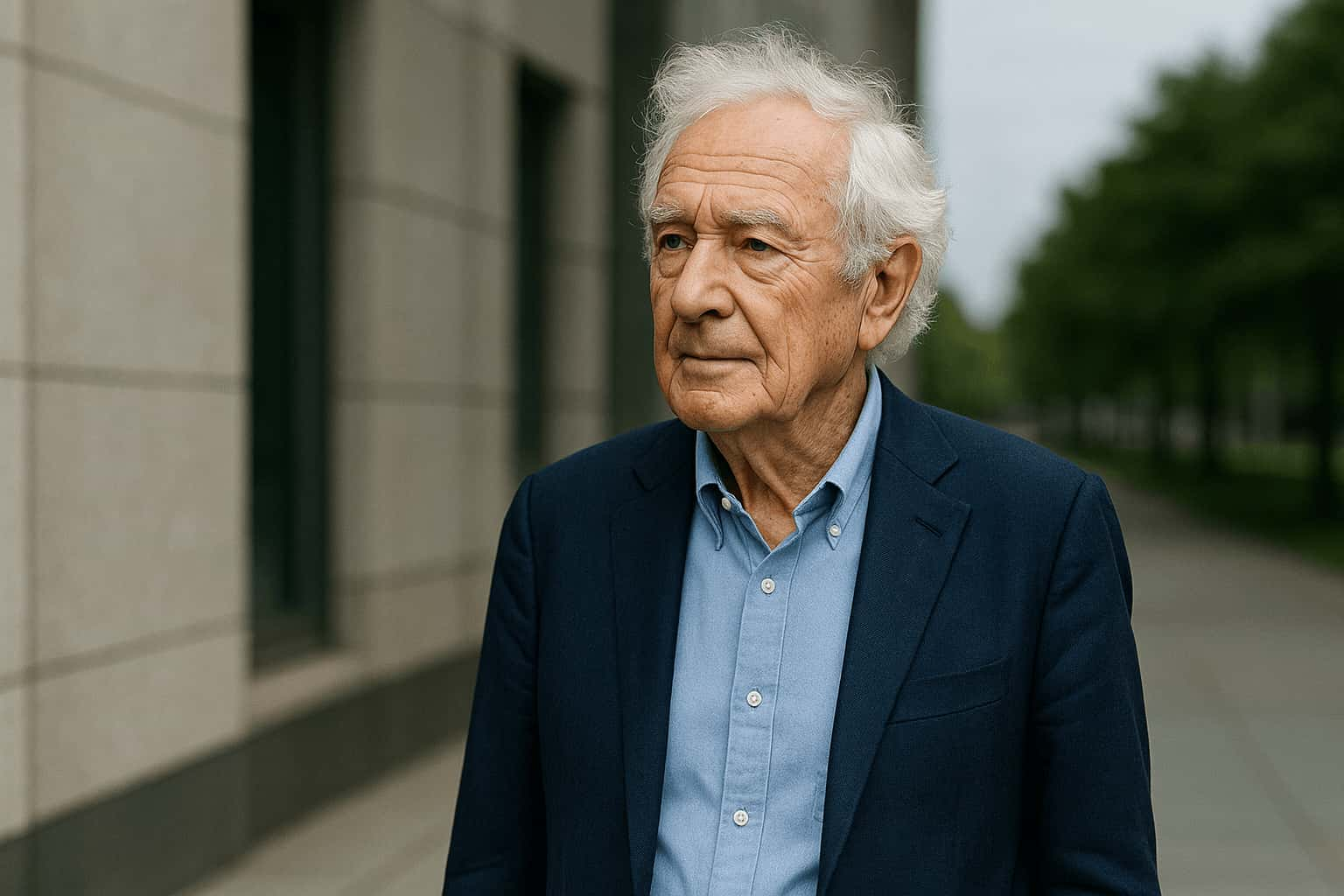
Sunglass Hut’s 2001 acquisition completed Leonardo’s retail strategy by providing dedicated sunglass retail expertise. The chain’s mall locations and seasonal focus complemented LensCrafters’ prescription eyewear emphasis.
Sports Market and Merger of Titans
The massive 2007 Oakley acquisition for $2.1 billion demonstrated Leonardo’s continued appetite for growth. This California-based company brought sports eyewear expertise and younger demographics. The deal expanded Luxottica’s market reach significantly.
Leonardo’s 2018 merger with French lens manufacturer Essilor represented his final masterstroke. At eighty-three, he created the world’s most comprehensive eyewear company. The deal combined frame manufacturing with lens technology for complete vertical integration.
Legacy & Lessons Learned
Transforming the Eyewear Industry
Leonardo Del Vecchio’s legacy extends far beyond financial success to fundamental transformation of global eyewear industry. His vision elevated glasses from medical devices to fashion accessories worn by millions worldwide. The industry he left behind generates billions in annual revenue.
The Power of Vertical Integration
His vertical integration strategy created a business model copied by companies across industries. Leonardo proved that controlling every aspect of production and distribution provides sustainable competitive advantages. Modern entrepreneurs study his approach to supply chain management.
Redefining Consumer Expectations
The fashion-forward approach Leonardo pioneered changed consumer expectations permanently. Today’s eyewear buyers expect style, quality, and brand prestige in their purchases. His influence shaped an entire generation’s relationship with glasses and sunglasses.
Visionary Leadership and Innovation
A Culture of R&D and Quality
Leonardo’s commitment to research and development established innovation as Luxottica’s core strength. The company’s 11,000 patents and designs reflect decades of continuous improvement. His investment philosophy prioritized long-term growth over short-term profits.
Founder-Led Dedication
His hands-on leadership style demonstrated the importance of founder involvement in company operations. Even in his eighties, Leonardo remained actively engaged in strategic decisions. This dedication inspired employees and maintained company culture.
Strategic Growth and Global Expansion
Smart Acquisitions
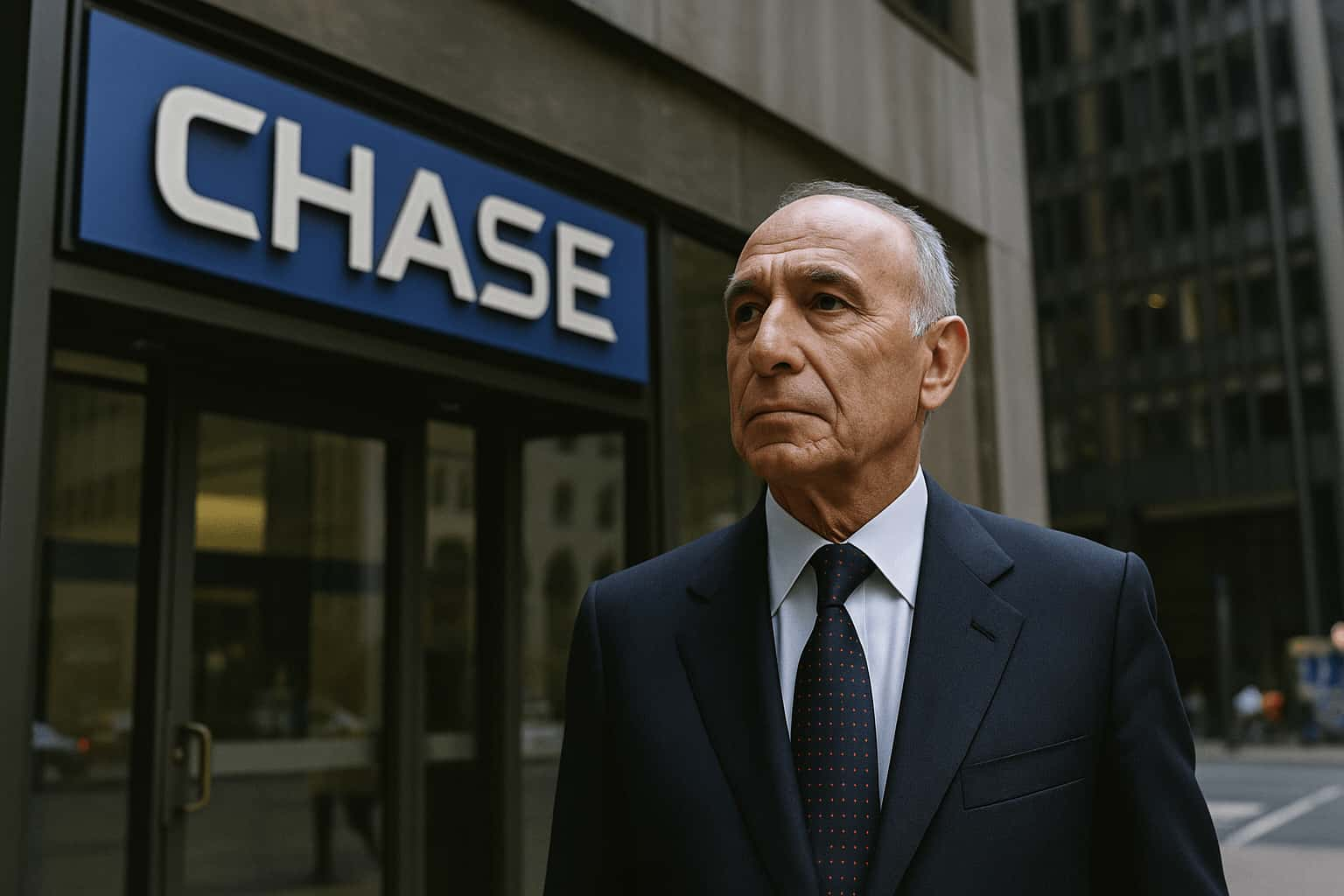
The acquisition strategy Leonardo developed provides a masterclass in strategic growth. He identified undervalued brands and retail chains, then invested in their restoration. His patient approach to integration preserved brand identities while achieving synergies.
Global Growth Done Right
Leonardo’s global expansion methodology offers lessons for international business development. He entered new markets carefully, establishing local partnerships and understanding cultural preferences. This measured approach minimized risks while maximizing opportunities.
Commitment to Craftsmanship
His emphasis on quality craftsmanship in an increasingly automated world preserved artisanal traditions. Leonardo understood that premium pricing requires superior products. This philosophy attracted discerning customers willing to pay for excellence.
Entrepreneurial Lessons
Lessons from a Humble Start
The entrepreneurial lessons from Leonardo’s journey inspire business leaders worldwide. His story proves that humble origins need not limit ultimate achievements. Determination, strategic thinking, and relentless execution can overcome any obstacle.
Patience as a Growth Strategy
Modern entrepreneurs can learn from his long-term perspective and patience with business development. Leonardo built Luxottica over decades, not years. His methodical approach created sustainable success rather than quick profits.
Ongoing Inspiration
For readers seeking inspiration for their own entrepreneurial journeys, The Phoenix Ascent features many similar rags-to-riches stories. These narratives demonstrate how ordinary people achieve extraordinary success through perseverance and vision.
The Business Philosophy That Built an Empire
Leonardo Del Vecchio’s success stemmed from a distinctive business philosophy that combined Italian craftsmanship with global vision. His approach emphasized long-term thinking over short-term gains. This patient strategy allowed Luxottica to build sustainable competitive advantages.
Quality remained the cornerstone of every business decision throughout his career. Leonardo understood that premium pricing required exceptional products that justified customer investment. His commitment to excellence created brand loyalty that lasted generations.
Innovation drove continuous improvement across all aspects of Luxottica’s operations. Leonardo invested heavily in research and development when competitors focused solely on cost reduction. This forward-thinking approach kept the company ahead of industry trends.
Vertical integration became Leonardo’s signature strategy for maintaining control over product quality and customer experience. By owning manufacturing, distribution, and retail operations, Luxottica could ensure consistent standards. This comprehensive approach eliminated dependencies on external partners.
The fashion revolution Leonardo initiated required deep understanding of consumer psychology and market trends. He recognized that eyewear purchases involved emotional as well as functional considerations. This insight guided product development and marketing strategies.
Strategic acquisitions formed a crucial component of Leonardo’s growth methodology. He identified undervalued brands with strong heritage and loyal customer bases. Patient investment and careful integration restored these brands to prominence.
Global expansion required cultural sensitivity and local market understanding. Leonardo’s international strategy respected regional preferences while maintaining brand consistency. This balanced approach enabled successful entry into diverse markets worldwide.
Employee development and company culture received significant attention throughout Leonardo’s leadership tenure. He understood that motivated, skilled workers were essential for maintaining quality standards. Investment in human capital provided long-term competitive advantages.
Impact on Modern Business Practices
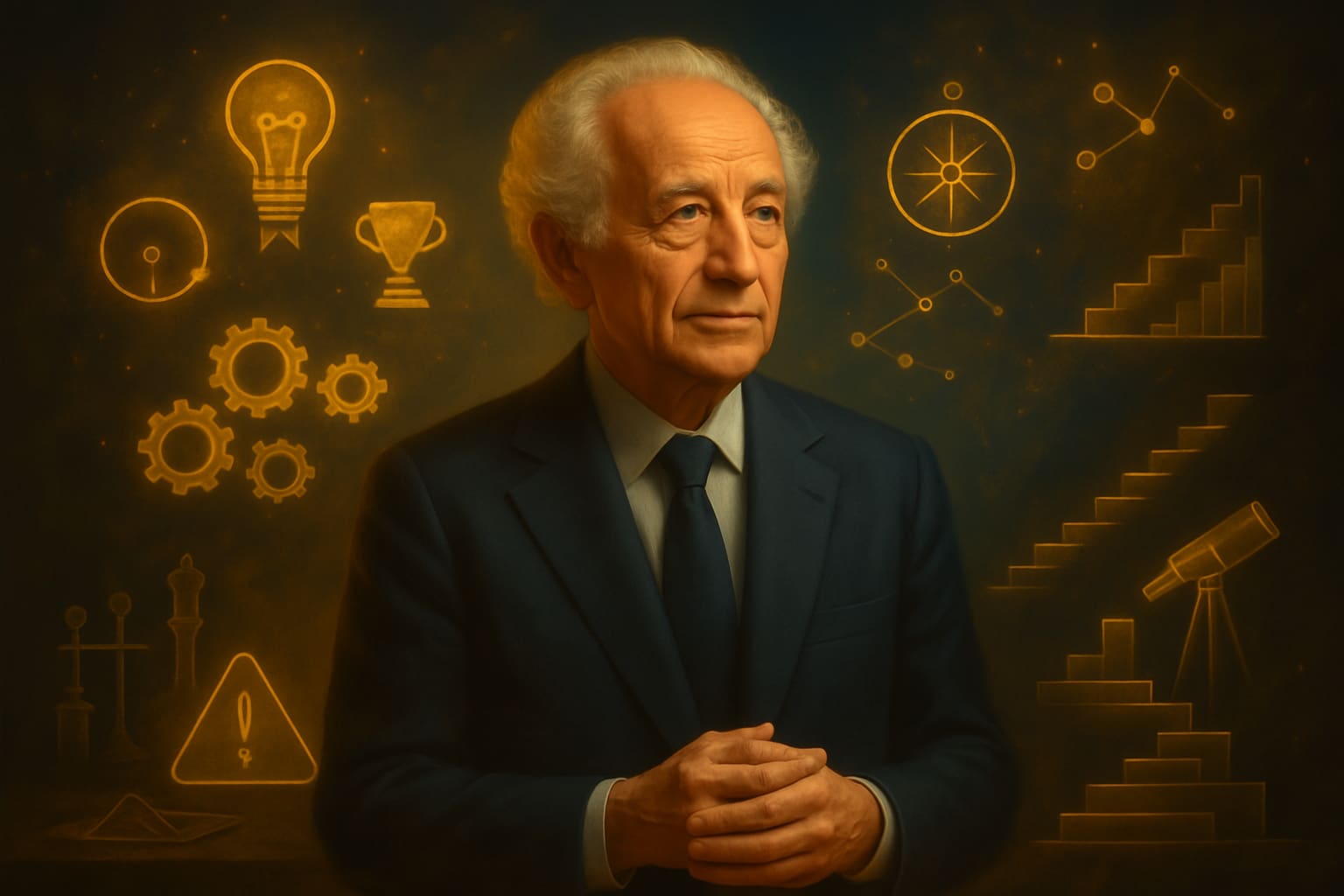
Leonardo Del Vecchio’s influence extends far beyond the eyewear industry to modern business practices across sectors. His vertical integration model inspired companies in fashion, technology, and consumer goods. Contemporary entrepreneurs study his methods for building comprehensive business ecosystems.
The luxury brand licensing strategy Leonardo pioneered became standard practice in multiple industries. Fashion houses now routinely license their names for accessories, fragrances, and lifestyle products. His template created new revenue streams for established brands.
His approach to celebrity endorsements and product placement revolutionized marketing across industries. Modern brands invest heavily in influencer partnerships and strategic product placements. Leonardo’s early recognition of celebrity influence shaped contemporary marketing strategies.
The emphasis on research and development that characterized Luxottica’s growth influenced corporate investment priorities. Companies now allocate significant resources to innovation and patent development. Leonardo’s long-term perspective on R&D investment became industry standard.
His patient approach to international expansion provides lessons for global business development. Modern companies study Luxottica’s methodical market entry strategies. The careful balance between global consistency and local adaptation remains relevant today.
The acquisition and integration strategies Leonardo developed offer templates for corporate growth. His ability to preserve brand identities while achieving operational synergies guides modern merger and acquisition activities. Business schools teach case studies based on his methods.
Quality management systems implemented at Luxottica influenced manufacturing standards across industries. Leonardo’s commitment to excellence established benchmarks that competitors struggled to match. His quality-first philosophy continues inspiring business leaders worldwide.
Personal Characteristics That Drove Success
Leonardo Del Vecchio possessed unique personal characteristics that enabled his extraordinary business success. His humble origins instilled appreciation for hard work and attention to detail. These qualities remained constant throughout his rise to billionaire status.
Curiosity and continuous learning drove his personal and professional development. Leonardo studied industrial design while working full-time, demonstrating commitment to self-improvement. This intellectual curiosity guided strategic decisions throughout his career.
Risk tolerance balanced with careful analysis characterized his decision-making process. Leonardo took calculated risks based on thorough market research and strategic planning. His bold moves were supported by solid foundations and contingency planning.
Persistence in the face of obstacles enabled him to overcome numerous challenges. Early business difficulties could have discouraged less determined entrepreneurs. Leonardo’s unwavering commitment to his vision sustained him through difficult periods.
Attention to detail distinguished his products and business operations from competitors. Leonardo personally involved himself in design decisions and quality control processes. This hands-on approach ensured consistent excellence across all company activities.
Vision for long-term growth guided strategic planning and resource allocation. While competitors focused on quarterly results, Leonardo planned for decades. This extended perspective enabled sustainable growth and market leadership.
Adaptability allowed him to evolve with changing market conditions and consumer preferences. Leonardo embraced new technologies and business models when they served his strategic objectives. His flexibility prevented obsolescence in rapidly changing markets.
Conclusion

Leonardo Del Vecchio’s extraordinary journey from orphaned child to billionaire entrepreneur stands as one of history’s most inspiring rags-to-riches stories. His transformation of the global eyewear industry created lasting impact that continues influencing business practices today.
The lessons embedded in his story transcend industry boundaries and geographical limitations. Entrepreneurs worldwide can apply his strategic principles to their own ventures. His emphasis on quality, innovation, and vertical integration provides timeless business wisdom.
Leonardo’s legacy lives on through the millions of people who wear Luxottica brands daily. Ray-Ban, Oakley, and countless other labels carry his vision forward. The company he built employs over 140,000 people across 150 countries.
His story reminds us that circumstances of birth need not determine ultimate destiny. Through determination, strategic thinking, and unwavering commitment to excellence, anyone can achieve remarkable success. Leonardo Del Vecchio proved that dreams backed by action become reality.
The eyewear industry he revolutionized continues evolving, but his foundational principles remain relevant. Future entrepreneurs can study his methods and adapt them to modern challenges. His legacy provides a roadmap for building sustainable business empires.
For those interested in learning more about Leonardo Del Vecchio’s complete life story and business achievements, Wikipedia offers comprehensive biographical information and detailed company history.
Final Reflections
Leonardo Del Vecchio’s story continues inspiring entrepreneurs who face seemingly impossible odds. His transformation from orphaned child to global business leader proves that determination can overcome any circumstance. The principles he embodied remain relevant for modern business success.
His legacy reminds us that true wealth extends beyond financial accumulation to positive impact on society. Leonardo created thousands of jobs and transformed an entire industry. His contributions improved lives worldwide through better products and economic opportunities.
The eyewear empire he built stands as a monument to human potential and strategic vision. Future generations will study his methods and adapt them to new challenges. Leonardo Del Vecchio’s name will forever symbolize entrepreneurial excellence and transformative leadership.
- From Bullied Dropout to Billionaire: The Extraordinary Rise of François Pinault
- From Housing Projects to Fortune 500: The Extraordinary Rise of Ursula Burns
- From Homeless to Billionaire: The Extraordinary Journey of John Paul DeJoria
- From Poverty to Global Empire: The Extraordinary Journey of Ingvar Kamprad
- From Desert Sands to Billion-Dollar Empire: The Extraordinary Journey of Mohed Altrad

